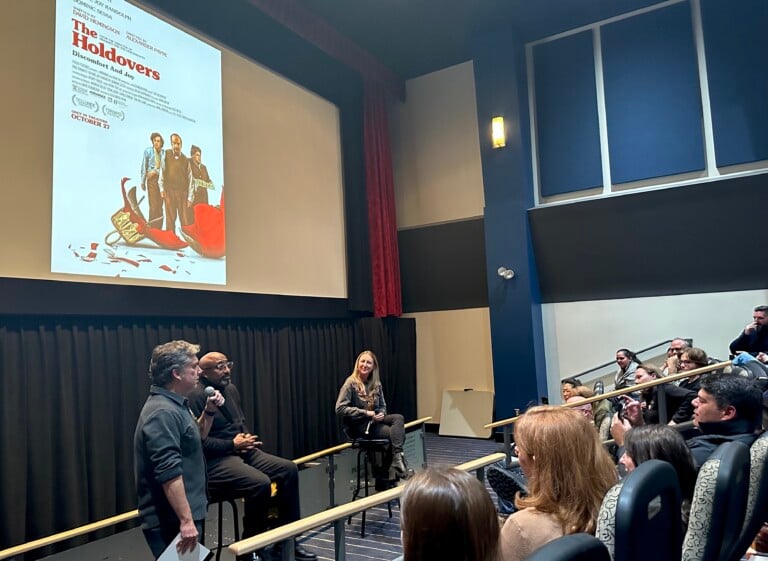Missed Opportunities
Chris Stinson talks about the lack of filmmaking incentives in the Granite State

Back in early November, as “The Holdovers” was debuting in theaters nationwide, a crowd packed the 7 p.m. showing at Red River Theatres in Concord to the brim. Not surprising, perhaps, for a critically acclaimed film set at a New England boarding school — not to mention the buzzy return of director Alexander Payne and his “Sideways” muse, actor Paul Giamatti.
But it was also a reunion of sorts for Concord native Chris Stinson, who worked as a producer on the film alongside stunt coordinator Amy Greene, his “filmmaking partner and partner in life.”
“Too many people to shout-out from high school here, which is pretty fun,” Stinson said, after the screening wrapped up. “Some of you made films with me on my VHS
camera. I have some footage of many of you.” Nervous laughter ensued.
Luckily for those in the audience, Stinson and Greene had another, more pressing mission for the evening: making the case that this film could have been made in the Granite State.
They did lean on New Hampshire a bit for casting, scouting at Saint Paul’s School and Phillips Exeter Academy. Ian Dolley, of Manchester, landed a supporting role as a student at the fictional Barton Academy boarding school.
But right now, Stinson and Greene say, it’s a hard sell for studios to do much more here. Unlike neighboring Massachusetts, where “The Holdovers” was filmed, New Hampshire doesn’t offer much in the way of film incentives. Stinson and Greene acknowledge it’d be hard for New Hampshire, with its limited revenue streams, to match Massachusetts’ 25% tax credit.
“I think a lot of times with financiers or investors, sometimes you can’t get around the need and desire to have the word ‘tax incentive’ or ‘tax rebate’ on paperwork somewhere,” Greene said.
But there are other ways to entice film crews, they say. A more modest tax incentive would be ideal in their view, but so would making it easier (and cheaper) to film on state or local properties. Reviving the mostly dormant state film office, with someone to act as a point person for filmmakers who have questions about scouting locations or other logistics, would also be huge.
“Most states already have this infrastructure,” Stinson said.
Economic incentives aside, they said, the Granite State’s scenery speaks for itself. But even the more mundane backdrops could be appealing for film crews feeling weary of jumping through hoops elsewhere.
“Some of the locations are our biggest talking points,” Greene said. “Like, if you needed to shoot in an airport, and you’re filming in Massachusetts, it might be difficult — it is difficult — to shoot at Logan, and pretty costly. Between Manchester and Pease, there are some airports in New Hampshire that are much more manageable.”
Their campaign is as much personal as it is professional. The pair relocated to Portsmouth from Los Angeles a few years back, which worked out perfectly as they worked on back-to-back films set in the region, “Knives Out” and “Sound of Metal.”
“We’re able to do our work and live the dream of being able to work in the film industry and actually live where we want to live,” Greene said.
“And if we can create more of an industry here,” Stinson added, “we can get more people to do that and not have to move away.”
 In life, Geoffrey Holt lived modestly, reportedly without a car or TV, in a sparsely furnished mobile home. But after his death, his generous, unexpected $3.8 million gift to his hometown of Hinsdale earned him the attention of news outlets across the country, from CNN to the New York Post. “He seemed to have what he wanted,” his friend Edwin Smith told the Associated Press. “But he didn’t want much.”
In life, Geoffrey Holt lived modestly, reportedly without a car or TV, in a sparsely furnished mobile home. But after his death, his generous, unexpected $3.8 million gift to his hometown of Hinsdale earned him the attention of news outlets across the country, from CNN to the New York Post. “He seemed to have what he wanted,” his friend Edwin Smith told the Associated Press. “But he didn’t want much.”
Several local spots are featured in Conde Nast Traveler’s 2023 Readers’ Choice Awards for the Best Ski Resorts in the U.S. and Canada. Bretton Woods landed in the top 10, followed by Waterville Valley (No. 15) and Wildcat Mountain (No. 28), heralded as “the most scenic resort in the East.”
















